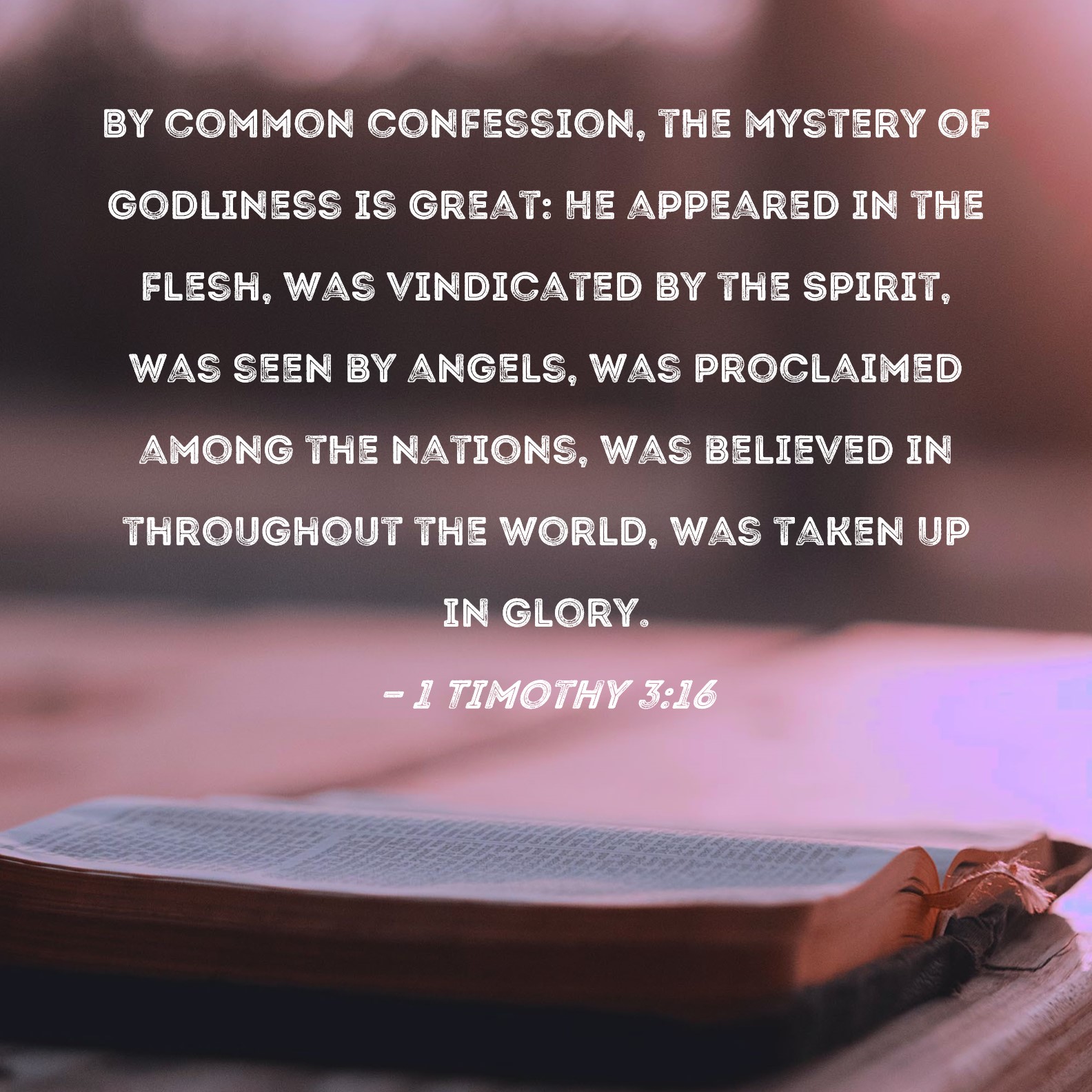I know what you mean check this out. These all are verifiable documentation with source citation included. Most works can be looked up here
Wayback Machine
There maybe a few things I say that could be questionable. However, I assure you every quote has its source cited and can easily be found. All facts. We all agree every believer needs to seek the truth or share it with others.
“And Jesus came, and spake unto them, saying, All power is given unto me in heaven and in earth. Goe ye therefore, and teach all nations, baptising them in the Name of the Father, and of the Son, and of the holy Ghost: Teaching them to observe all things, whatsoever I have commanded you: and lo, I am with you alway, even unto the end of the world. Amen.“ {
Matthew 28:18-20}
In the book of
Acts 2:38, the evangelist Luke described the same statement of Jesus from
Matthew 28:19.
20. But in
Acts 1:8 Jesus calls us to proclaim His truth to all nations, without any mention of baptism in the name of the Trinity:
„But ye shall receive power, after that the Holy Ghost is come upon you: and ye shall be witnesses unto Me both in Jerusalem, and in all Judaea, and in Samaria, and unto the uttermost part of the earth.“ {
Acts 1:8}
Why does this difference exist? Because This verse (
Matthew 28:18-20) was changed in the year 325 A.D. We know the following facts: the doctrine of the Trinity” was the basis of many pagan religions. During the council in Nicea in 325 A.D., Emperor Constantine ordered that an ecumenical Bible be compiled . He entrusted this task to the leading Bishop Eusebius of Caesarea, who implemented what Bishop Origen had tried earlier but without success. Interestingly, Bishop Eusebius quoted the above verse differently 17 times in his works before Nicea here are a few:
“Surely none save our only Savior has done this, when, after His victory over death, he spoke the word to His followers, and fulfilled it by the event, saying to them, “Go ye and make disciples of all nations in My name.” {
Eusebius: Oration in Praise of Emperor Constantine, Chapter 16, Section 8}
“But while the disciples of Jesus were most likely either saying thus, or thinking thus, the Master solved their difficulties, by the addition of one phrase, saying they should triumph “In MY NAME.” And the power of His name being so great, that the apostle says: “God has given Him a name which is above every name, that in the name of Jesus every knee should bow, of things in heaven, and things in earth, and things under the earth,” He shewed the virtue of the power in His Name concealed from the crowd when He said to His disciples: “Go, and make disciples of all the nations in My Name.” He also most accurately forecasts the future when He says: “for this gospel must first be preached to all the world, for a witness to all nations.” {
Eusebius: Proof of the Gospel, Book III, ch. 7, 136 (a-d), p. 157}.
“Who said to them: ́Make disciples of all the nations in My Name. ́” {
Eusebius: Proof of the Gospel, Book III, Chapter 7, 138 (c), p. 159}
“Relying upon the power of Christ, who had said to them, “Go ye and make disciples of all the nations in My name.” {
Eusebius: Book III of his History, Chapter 5, Section 2, (about the Jewish persecution of early Christians)}
“With one word and voice, He said to His disciples: “Go, and make disciples of all nations in My Name, teaching them to observe all things whatsoever I have commanded you” {
Eusebius: Proof of the Gospel, Book III, ch 6, 132 (a), p. 152}
It is noteworthy that after the introduction of the Trinity in 325 AD, Eusebius altered the form of certain verses, adopting the version we have today in his writings. Throughout the entire Bible, baptism is consistently described as being performed 'in the name of Jesus.' The true Bible does not provide conflicting sets of instructions, yet
Matthew 28:19 seems to directly conflict with all other baptismal references. This discrepancy is strong evidence of potential falsification, as the two versions are fundamentally opposed and cannot coexist without contradiction. God never provides conflicting instructions!
“When they heard this, they were baptised in the Name of the Lord Jesus.“ {
Acts 19:5}
“But when they believed Philip preaching the things concerning the kingdom of God, and the Name of Jesus Christ, they were baptised, both men and women. ́” {
Acts 8:12}
“For as yet he was fallen upon none of them: only they were baptised in the Name of the Lord Jesus“. {
Acts 8:16}
“And he commanded them to be baptised in the Name of the Lord“. {
Acts 10:48}
“For as many of you as have been baptised into Christ, have put on Christ.“ {
Galatians 3:27}
Whose name do we call at baptism in order to be washed from sin?
“Then Peter said unto them, Repent, and be baptised every one of you in the Name of Jesus Christ, for the remission of sins, and ye shall receive the gift of the holy Ghost.“ {
Acts 2:38}
“And now, why tarriest thou? Arise, and be baptised, and wash away thy sins, calling on the name of the Lord.“ {
Acts 22:16}
Is there any other name under heaven besides Jesus who can save us?
“He that believeth and is baptised, shall be saved, but he that believeth not, shall be damned.“ {
Mark 16:16}
Actually, baptism and immersion in the water are a symbol of His death, His lying in the grave, and His resurrection. ONLY Jesus died, and through baptism, we show acceptance of His sacrifice for us and thereby become Christians.
-The immersion in the water symbolises the death of Jesus on the cross
-The short stay in the water symbolises the time of Jesus in the grave
-The emergence from the water symbolises the resurrection of Jesus
The apostle Paul clearly emphasises that baptism is only in the name of Jesus and that this is directly connected with the sacrifice of Jesus on the Cross:
“Is Christ divided? was Paul crucified for you? or were ye baptised in the name of Paul?” {
1 Corinthians 1:13}
“Know ye not, that so many of vs as were baptised into Jesus Christ, were baptised into His death? Therefore we are buried with Him by baptism into death, that like as Christ was raised up from the dead by the glory of the Father: even so wee also should walk in newness of life” {
Romans 6:3}
“Buried with Him in baptism, wherein also you are risen with Him through the faith of the operation of God, who hath raised Him from the dead.“ {
Colossians 2:12}
Below is the excerpt from Shem Tob’s MSS Hebrew Matthew Gospel, Matthew 28th chapter, which comes from a book by Dr. George Howard, a specialist in the Hebrew language. The original of this manuscript is in the Jewish Theological Seminary of America in New York. This Gospel was saved by Hebrews during the first century and was discovered in the 14th century. In the 14th century, there was no discussion of the Trinity! And in this old original manuscript of the Gospel,
Matthew 28:19, there is no trinitarian form of baptism, there is no statement by Jesus in this regard. Matthew wrote his Gospel in Hebrew and not in Greek, as most theologians claim today:
“Matthew also issued a written Gospel among the Hebrews in their own dialect while Peter and Paul were preaching at Rome and laying the foundations of the church.” {Irenaeus in the second century: Adv. Haer. 3.1.1}
18. Jesus drew near to them and said to them: To Me has been given all power in heaven and earth.
19. Go
20. and (teach) them to carry out all the things which I have commanded you forever.
The same is also stated in the other 3 Bible translations:
“Then, coming toward them, Jesus spoke, saying, ‘All power has been given me in heaven and on earth. So, go and make disciples in all nations IN MY NAME, teaching them to obey all the things that I commanded you. And [Look!] I’ll be with you every day until the end of the age.“ {
Matthew 28:18-20} Bible 2001
“Jesus approached and said to them, “All authority has been given to me in heaven and on earth. Consequently, when you go, disciple all nationalities IN MY NAME. Teach them to keep everything I commanded you to do. Understand this: I am with you every day until the consummation of the age!“ {
Matthew 28:18-20} MIT – Idiomatic EN – 2006
“Yeshua [God is Salvation] drew near to them and said to them: “All power has been given to Me in heaven and earth”. “Go and make disciples, of all the nations, to believe IN MY NAME” “and teach them to observe all the words which I have commanded you, forever” {
Matthew 28:18-20} New Messianic Version Bible
Today’s Bible says that the apostles should go and all should baptise in the name of the Father, Son, and holy Spirit, which is a contradiction of the rest of the New Testament, where the apostles were all exclusively baptised in the name of Jesus! The true Bible can never contradict itself! The Catholic Church, which proudly proclaimed a change in the Sabbath,
confirms itself that it changed Matthew 28:19 –
“The baptismal formula was changed from the name of Jesus Christ to the words Father, Son, and holy Spirit by the Catholic Church in the second century.“ {Britannica Encyclopedia, 11th Edition, Volume 3, page 365}

